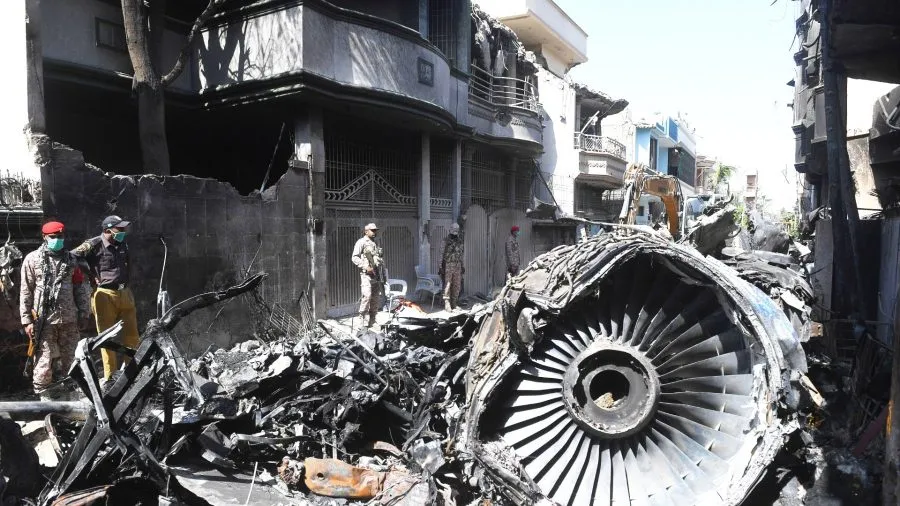
Pakistan grounds 262 pilots over dodgy license concerns
Jun 27, 2020

Pakistan has grounded 262 pilots due to concerns over the authenticity of their licenses. This decision follows an investigation that revealed discrepancies in the credentials of some pilots, raising serious safety and regulatory issues within the aviation sector. The move aims to ensure the integrity of the country's airline industry and restore public confidence. Authorities are conducting further scrutiny to determine the extent of the problem and to prevent any potential risks to passengers. This action highlights ongoing efforts to improve aviation standards and uphold safety protocols amid mounting scrutiny of pilot qualifications in the region.
In a significant move to ensure aviation safety, Pakistan has grounded 262 pilots due to concerns regarding their licenses. This situation has raised alarms within the aviation industry, highlighting the critical importance of regulatory compliance and the integrity of pilots' credentials. The decision comes amid increasing scrutiny of aviation practices in the country, prompting discussions on the broader implications for air travel in Pakistan and beyond.
Understanding the License Controversy
The grounding of these pilots stems from investigations that revealed discrepancies in their licensing. The Pakistan Civil Aviation Authority (PCAA) initiated a review, uncovering that many of the licenses held by the pilots were either obtained through fraudulent means or lacked proper verification. This situation has cast a shadow over Pakistan's aviation sector, which has been striving to improve its global standing.
To better understand the scale of the issue, the following table illustrates the breakdown of the grounded pilots based on their respective airlines:
| Airline | Number of Grounded Pilots |
|---|---|
| Pakistan International Airlines (PIA) | 120 |
| Air Blue | 45 |
| SereneAir | 30 |
| Other Airlines | 67 |
This revelation has not only affected the airlines in question but has also raised concerns among passengers regarding safety standards. The grounding of such a significant number of pilots leads to flight cancellations and delays, causing inconvenience to travelers and impacting the reputation of the airlines involved.
The Impact on Pakistan's Aviation Sector
The implications of this grounding extend beyond immediate logistical challenges. It raises questions about the regulatory framework governing the aviation sector in Pakistan. Stakeholders are calling for stringent measures to enhance transparency and accountability within the industry. The PCAA is under pressure to implement more robust verification processes to prevent such occurrences in the future.
Moreover, the international community is closely watching the situation. The European Union Aviation Safety Agency (EASA) and other global aviation bodies have expressed concerns regarding the safety protocols in place. This scrutiny could affect the possibility of Pakistani airlines expanding their operations internationally, as safety is a paramount consideration for potential travelers.
Regulatory Response and Future Measures
In response to the crisis, the PCAA has initiated a comprehensive review of its licensing procedures. The authority aims to establish a more rigorous vetting process for pilots to ensure that all credentials are valid and properly authenticated. This move is crucial not only for restoring public confidence but also for aligning with international aviation standards.
Furthermore, the PCAA is set to engage with various stakeholders, including airline operators and industry experts, to formulate a strategy that addresses the root causes of the issue. Workshops and training sessions are being planned to educate current and prospective pilots about the importance of maintaining integrity in their credentials.
Public Perception and Passenger Concerns
The grounding of the 262 pilots has understandably raised concerns among the traveling public. Passengers are questioning the safety measures in place, leading to a decline in consumer confidence in local airlines. Social media platforms have become a hotbed for discussions on the safety of air travel in Pakistan, with many advocating for increased transparency from airlines about their pilots’ qualifications.
To rebuild trust, airlines must be proactive in communicating the steps they are taking to rectify the situation. This includes providing updates on the status of grounded pilots, ensuring that remaining pilots meet all necessary qualifications, and sharing information about the measures being implemented to prevent future occurrences of this nature.
Conclusion: A Call for Accountability
The grounding of 262 pilots in Pakistan serves as a crucial reminder of the importance of regulatory compliance in the aviation industry. As the PCAA and airlines work to address these issues, it is imperative that they prioritize safety and accountability. The future of Pakistan's aviation sector hinges on restoring public confidence and ensuring that all pilots are fully qualified to operate commercial flights.
In conclusion, while the immediate challenges may be daunting, the opportunity for meaningful reform exists. By implementing stricter licensing regulations and enhancing oversight, Pakistan can pave the way for a safer and more reputable aviation industry, ultimately benefiting both airlines and passengers alike.
Related Articles

Explore Thailand: The Best Islands to Visit for Paradise, Adventure, and Relaxation

The Ultimate Guide to the Best Islands in Thailand for Your Next Getaway

Do babies need passports? How to get a passport for a newborn

How to get a U.S. passport fast: here’s how to expedite the process

What is Mobile Passport Control: 5 reasons why you should use it

SENTRI vs. Global Entry: A detailed guide

Do you need a passport to go to the Bahamas? Let’s find out

Do you need a passport to go to Mexico? A detailed guide

Do you need a passport to go to Canada? We got the answer

Do You Need a Passport for a Cruise: An Essential Travel Guide

Booster Seat Requirements: All the Rules to Follow in Your Rental Car

What Are the World’s Most Powerful Passports, and How Does Yours Rank?

How to Take a Passport Photo at Home: A Helpful Guide

You've got to have heart! Southwest's new livery

Your opinion: Should water be free on low cost carriers?

Young women bolder than guys as solo travellers
